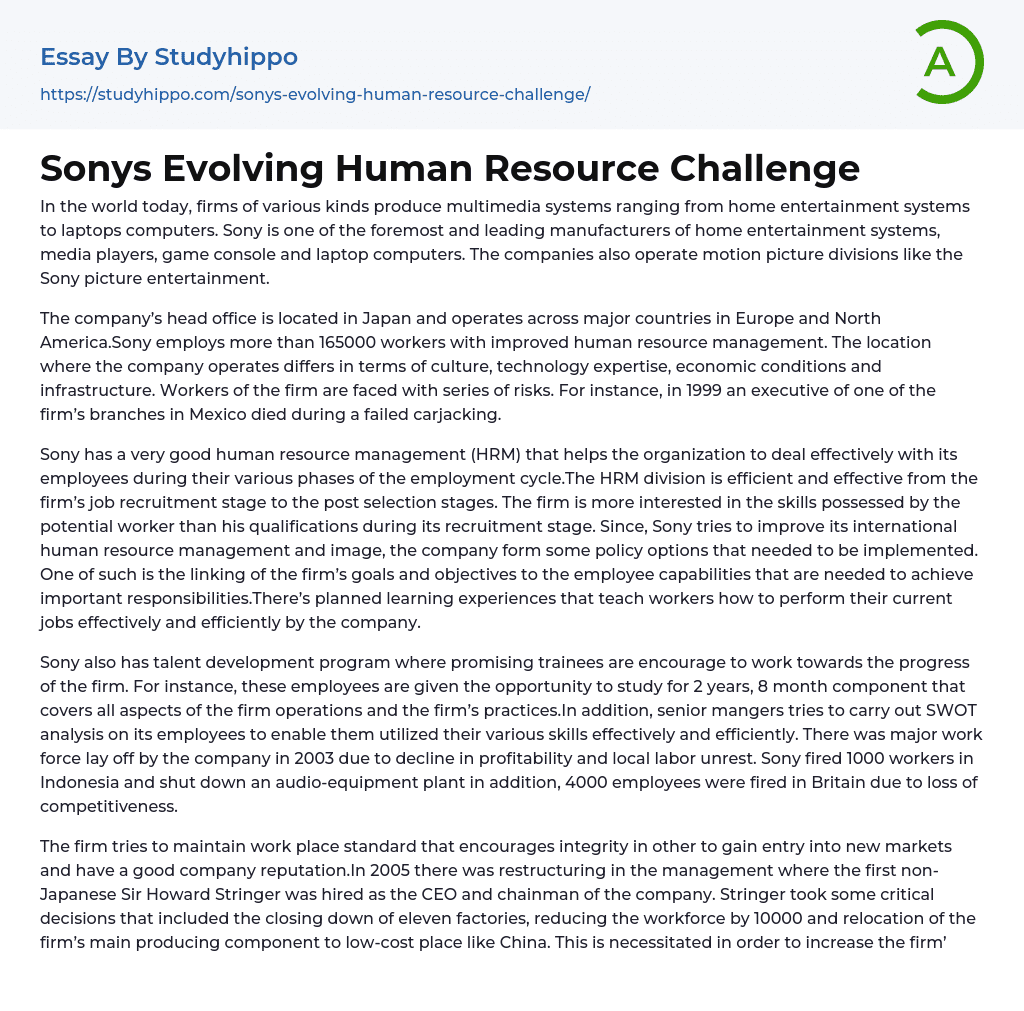Many companies produce multimedia devices, such as home entertainment systems and laptops. Sony is renowned for manufacturing a variety of products, including home entertainment systems, gaming consoles, media players, and laptops. Furthermore, the company has a foothold in the film industry through its subsidiary Sony Pictures Entertainment.
Sony has a global workforce of 165000+ employees, spanning major European and North American countries, in addition to its Japan headquarters. The company's enhanced human resource management is responsible for this expansion. Despite the variation in culture, technological skills, economic conditions, and infrastructure across different regions where Sony operates, employees face multiple risks. Tragically, one such occurrence took place at a branch in Mexico back in 1999 when an executive passed away following an unsuccessful carjacking attempt.
Sony has an effective and efficient human resource management (HR
...M) that supports the organization in effectively managing its staff throughout the various stages of the employment cycle. The HRM is involved in the company's recruitment process through to post-selection activities. Sony prioritizes skills over qualifications in the recruitment phase, as it is focused on improving its international HRM and image. The company has established policy options, such as linking employee capabilities to its objectives and goals, to be implemented. Additionally, planned learning experiences are provided to enable workers to effectively and efficiently perform their current roles.
Sony offers a talent development program to support the growth of the company. This program encourages promising trainees to work towards the progress of the firm by providing them with opportunities to study various aspects of the firm's operations and practices for 2 years and 8 months. Additionally, senior managers conduct SWOT analysis on employees t
help them utilize their skills effectively. Unfortunately, in 2003, Sony faced a decline in profitability and local labor unrest which led to significant workforce layoffs. The company had to let go of 1000 workers in Indonesia and shut down an audio-equipment plant and fired 4000 employees in Britain due to a loss of competitiveness.
The firm endeavors to uphold workplace standards that foster integrity to expand into new markets and maintain a favorable company reputation. In 2005, there was a management overhaul that resulted in the appointment of Sir Howard Stringer, the company's first non-Japanese CEO and chairman. Stringer implemented critical decisions, which included shutting down eleven factories, trimming the workforce by 10,000, and moving the firm's primary production component to cheaper locations like China. This initiative was aimed at reducing production costs and increasing profits since it was more cost-effective to manufacture in low-cost nations, given the stiff competition from other multinational corporations operating in China. Consequently, many companies face a scarcity of new hires. The key challenges facing the firm are stiff competition from rival firms, labor shortages, and high production costs that hamper the company's profitability.
Moreover, the firm encounters diverse surroundings such as culture, technology, economy, and legislation. It also confronts significant challenges related to economic modifications and reorganization. As a solution, Sony must efficiently handle its human resources to acquire a competitive edge over competitors. By presenting innovative products that cater to buyer preferences, the company can secure a considerable portion of the market share.
Sony's primary objectives should be to gain cost advantage and product differentiation. The company needs to offer comparable products and services as its competitors, but at a
lower cost. To reduce per unit costs, Sony must increase the value of units produced to total production costs by utilizing new technology, efficient work methods, and reducing overhead expenses. Additionally, Sony should enhance service and product quality by selecting better locations, promoting and packaging products effectively, and creating a perception of premium quality.
- American Dream essays
- Barriers To Entry essays
- Capitalism essays
- Central Bank essays
- Compensation essays
- Consumerism essays
- Economic Development essays
- Economic Growth essays
- Economic Inequality essays
- Economic System essays
- Economy essays
- Employment essays
- Export essays
- Finance essays
- Free Trade essays
- Gross Domestic Product essays
- Human Development essays
- Income Inequality essays
- Industry essays
- Inflation essays
- International Business essays
- International Trade essays
- Macroeconomics essays
- Materialism essays
- Max Weber essays
- Microeconomics essays
- Minimum Wage essays
- Monetary Policy essays
- Monopoly essays
- Pricing essays
- Profit essays
- Recession essays
- resources essays
- Taxation essays
- Trade essays
- Unemployment essays
- Warehouse essays
- World economy essays
- Bacteria essays
- Biotechnology essays
- Breeding essays
- Cell essays
- Cell Membrane essays
- Cystic Fibrosis essays
- Enzyme essays
- Human essays
- Microbiology essays
- Natural Selection essays
- Photosynthesis essays
- Plant essays




